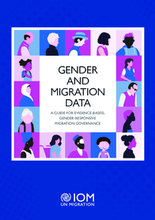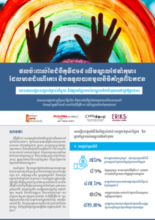Displaying 3001 - 3010 of 14432
This guidance note aims to address the migration data gaps in a manner relevant to all stakeholders, and promotes a whole-of-society approach. It is also meant to help operationalize IOM’s Migration Data Strategy and includes recommendations on enhancing gender indicators and gender-based methods in data production, protection, dissemination and use. The note provides succinct information on the extent to which gender is captured through macrolevel global data sets, along with a discussion of key issues relevant to gender and migration data.
The purpose of Policies and Practice: A Guide to Gender-Responsive Implementation of the GCM is to provide clear, concrete and practical guidance to governments and other key stakeholders on gender-responsive implementation of the Global Compact for Safe, Orderly and Regular Migration (GCM). Building on the gender-responsive approach outlined in the guiding principles of the GCM, this guide prioritizes the specific needs, challenges and vulnerable situations of women, girls and gender non-conforming people at all stages of migration due to their increased vulnerabilities to human rights violations and gender-based discrimination. It takes into consideration the multiple and intersecting forms of discrimination they may face while highlighting the positive contributions that they make in countries of origin, transit, and destination.
Lumos worked together with partners on the family-based care for unaccompanied children project between 2018 and 2020, in four camps in the Tigray region of Ethiopia. This evaluation report considers the various components of the project and provides recommendations to child protection and refugee response practitioners, with the aim of improving the quality of child protection programming and its impact on unaccompanied children in refugee contexts.
Drawing from a review of global reports and case studies, as well as from information sourced from Global Social Service Workforce Alliance members, this report explores the key challenges social service organizations and workers have faced since the beginning of the pandemic and showcases how they have been able to adapt and innovate in response to such challenges.
Este resumen para niños y jóvenes acompaña al informe "Hagamos que nuestras voces cuenten: las respuestas de los niños y los jóvenes a una encuesta mundial para el Día de debate general de 2021 sobre los derechos del niño y los cuidados alternativos".
For decades, First Nations have called for Canada to respect the sacredness of their children and youth by upholding the best interests of the child, substantive equality and cultural continuity. This call has been echoed in numerous reports including, but not limited to, the Royal Commission on Aboriginal Peoples (1996), the Joint National Policy Review (2000), the Wen: De Reports (2005), the Truth and Reconciliation Commission (2005), A Roadmap to the Truth and Reconciliation Commission Call to Action #66 (2018) and the National Inquiry into Missing and Murdered Indigenous Women and Girls (2019). In June 2020, Bill S-217 (now S-210) was introduced by Senator Rosemary Moodie for the creation of an Office of the Commissioner for Children and Youth in Canada. The Bill proposes the establishment of an appointed Commissioner for Children and Youth to promote, monitor and report on
the implementation of Canada’s obligations under the United Nations Convention on the Rights of the Child.
This child and youth friendly summary accompanies the report "Make Our Voices Count: Children and Young People's Responses to a Global Survey for the 2021 Day of General Discussion on Children's Rights and Alternative Care".
This report was commissioned by a group of civil society organizations (CSOs) in an effort to get a broad sense of what children and young people themselves think about their experiences in alternative care.
This study was a small-scale piece of qualitative research that involved 21 semistructured interviews with founders, funders, and directors of RCIs across 7 countries. It was designed to better understand the impacts of COVID-19 on the operations of residential care institutions including funding, staffing, volunteering, children’s care, education, family connection and reintegration.










